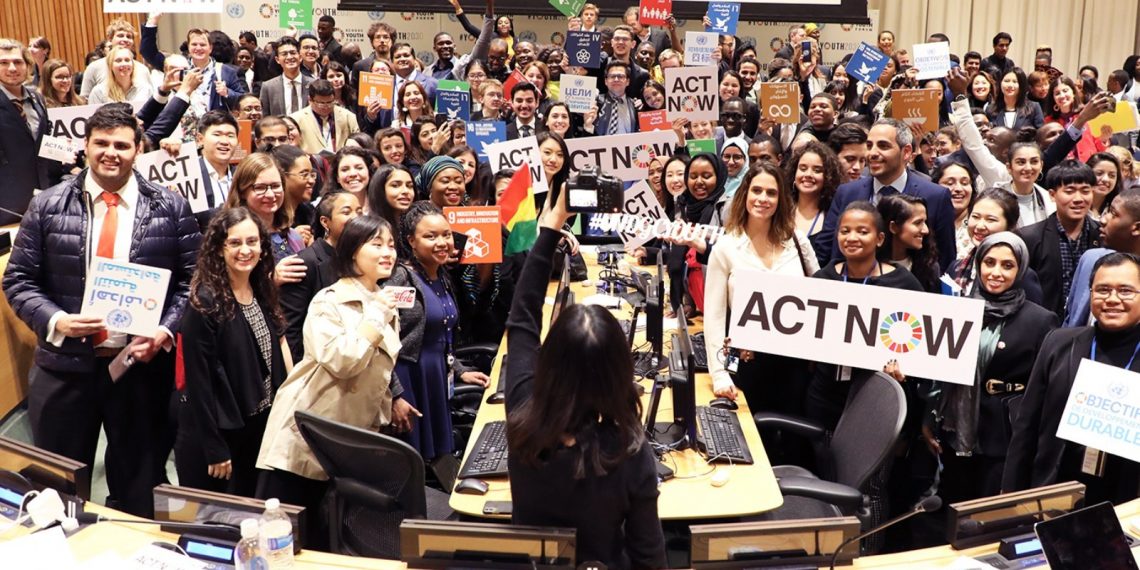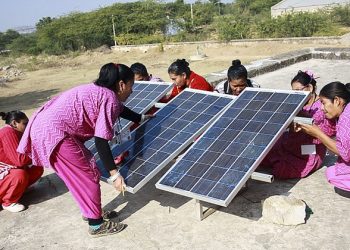New York, 10 April 2019 – More than 1,000 young leaders and advocates at the United Nations today called on the global community to deliver on their promise of a future that is sustainable, safe and equitable.
The youth leaders gathered at the two-day Economic and Social Council (ECOSOC) Youth Forum voiced alarm that 11 years before the 2030 deadline, progress on the Sustainable Development Goals (SDGs) remains slow, including on climate change – the greatest challenge of the world of today and tomorrow.
“It is your future, your livelihoods, your freedom, your security, your environment. You do not, and you must not take no for an answer,” said UN Secretary-General António Guterres, calling on young people “to keep up the pressure” in the lead-up to the Climate and SDG Summits in September this year.
“It is your future, your livelihoods, your freedom, your security, your environment. You do not, and you must not take no for an answer,” UN Secretary-General António Guterres
The ECOSOC Youth Forum, co-hosted by the UN Department of Economic and Social Affairs and the Office of the UN Secretary-General’s Envoy on Youth, is the largest annual gathering of young people at the United Nations. This year’s Forum took place at a time when many young people are leading changes around the world, demanding that their leaders listen to their concerns, and deliver on the promises they made in 2015 when they adopted the SDGs.
“Time and time again, youth have this burning fire, this resilient ability that no matter how many times we get pushed aside, overlooked, topped over, knocked down, we get back up every single time,” said Yolanda Joab from the Federated States of Micronesia, the keynote speaker at the Forum.
“Every day around the world, young people are teaching, creating, rallying, innovating, building, sailing, marching, questioning and dreaming because we believe in better,” added Ms. Joab, a climate activist and the Founder of Island PRIDE, an initiative that empowers communities in Micronesia to tackle climate change.
This year’s Forum, the first since the launch of a UN youth strategy last year, focused on the theme, Empowered, Included and Equal – very much in line with the strategy which seeks to strengthen the efforts of the UN System and stakeholders to place young people at the front and centre of the global development agenda.
The President of ECOSOC, Inga Rhonda King, pointed out that young people are the future and the hope of the world. She encouraged them “to continue to speak up and relentlessly put pressure on your governments to raise ambition for climate action.”
Today, there are 1.2 billion young people, between the ages of 15 and 24, making up 16 per cent of the global population. Most live in developing countries. Millions do not have access to quality education, decent work or other opportunities. By 2030, 1.9 billion young people are projected to turn 15, and will need skills, jobs and livelihoods to realize their full potential and lead meaningful lives.
“The ones that need us the most include the over 260 million young people who are not in school today, the 64 million young people who are unemployed, along with the 145 million young people who live in working poverty,” said the UN Secretary-General’s Envoy on Youth, Jayathma Wickramanayake. “Unless we create the conditions that allow young people everywhere to reach their full potential, it is clear that sustainable development and lasting peace cannot be achieved.”
“The ones that need us the most include the over 260 million young people who are not in school today, the 64 million young people who are unemployed, along with the 145 million young people who live in working poverty,” UN Secretary-General’s Envoy on Youth, Jayathma Wickramanayake.
Speaking at the side-lines of the Forum, youth participants at the SDG Media Zone discussed an array of issues of concern as well as innovative solutions to major challenges, including youth empowerment and leadership, sustainable consumption and production, the future of work and the need to act now for a more sustainable and healthier future.
“Africa is the youngest region in the world,” said Madelle Kangha, one of the 17 Young Leaders for the SDGs and the Founder of JumpStart Academy Africa – which aims to transform the education system across the continent, by providing leadership and entrepreneurship training to students.
“Sixty per cent of its population is under the age of 25 and by 2030, we are going to have a working age population of about 600 million,” she added, stressing that much more needs to be done in policy-making and reform to meet the needs of the growing population.
In her call to action, she urged for more inclusive dialogue between governments and young people from all walks of life, including those living with disabilities and in rural communities.
ABOUT THE ACT NOW CAMPAIGN
The UN Act Now Climate Campaign is global call to citizen action on climate change. Taking advantage of technical innovation, the campaign harnesses advances in Artificial Intelligence to spur behavior change. It highlights the impact that collective action can have at this critical moment in our planet’s history. The more people act, the bigger the impact. For more information, please visit: http://bit.ly/ACTNOWCampaign
ABOUT THE ECOSOC YOUTH FORUM
 The Youth Forum, which started 8 years ago, provides a platform for young leaders from around the world to engage in a dialogue among themselves and with UN Member States. It provides a space to share ideas and concrete actions to advance the 2030 Agenda for Sustainable Development, the Addis Ababa Action Agenda on financing for sustainable development, and the Paris Agreement on Climate Change. For more information, please visit: http://bit.ly/YouthForum19
The Youth Forum, which started 8 years ago, provides a platform for young leaders from around the world to engage in a dialogue among themselves and with UN Member States. It provides a space to share ideas and concrete actions to advance the 2030 Agenda for Sustainable Development, the Addis Ababa Action Agenda on financing for sustainable development, and the Paris Agreement on Climate Change. For more information, please visit: http://bit.ly/YouthForum19
 ABOUT THE SDG MEDIA ZONE
ABOUT THE SDG MEDIA ZONE
The SDG Media Zone brings together well-known personalities, government officials, content creators, influencers and media partners to highlight actions and solutions in support of the 2030 Agenda for Sustainable Development. Through impactful interviews, panel discussions and Ted-talk style talks, participants are encouraged to take the conversations out of the policy sphere and into the public discourse. For more information, please visit: https://www.un.org/sdgmediazone/
MEDIA CONTACTS
UN Department of Public Information
Devi Palanivelu |+1 917 495 5424 | palanivelu@un.org
Office of the UN Secretary-General’s Envoy on Youth
Nicholas Ceolin | +1 917 367 8575 | nicholas.ceolin@un.org
UN Department of Economic and Social Affairs
Paul Simon | +1 917 367 5027 | simonp@un.org



